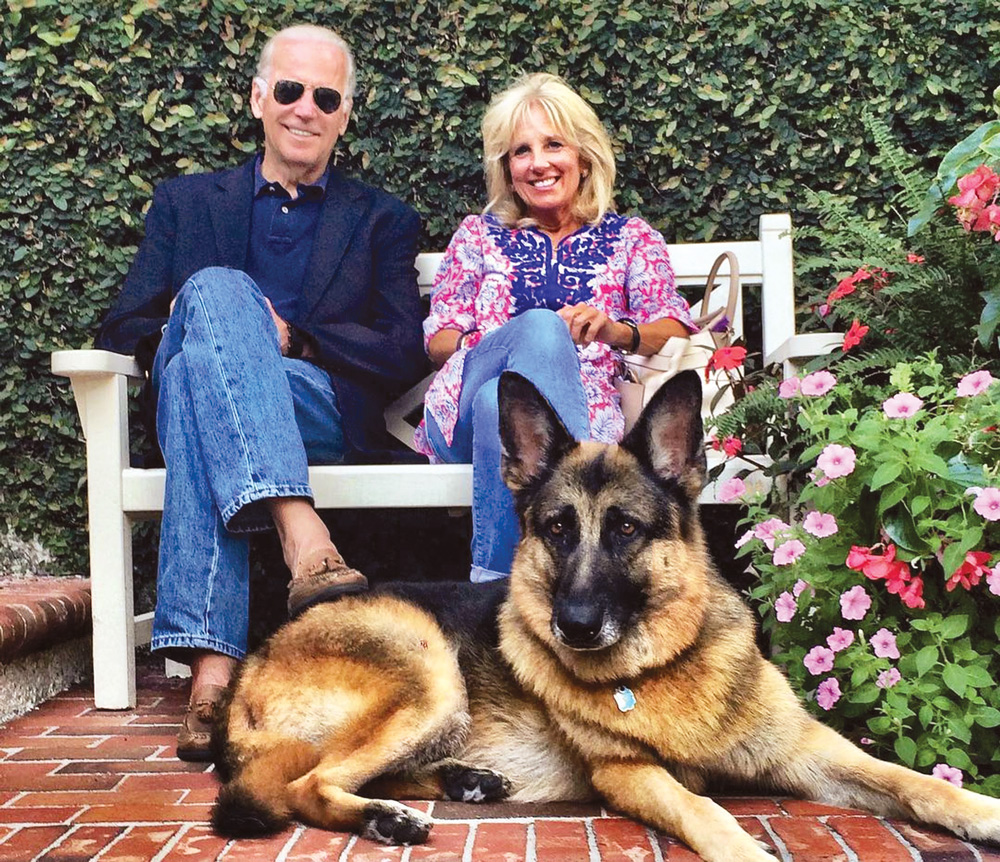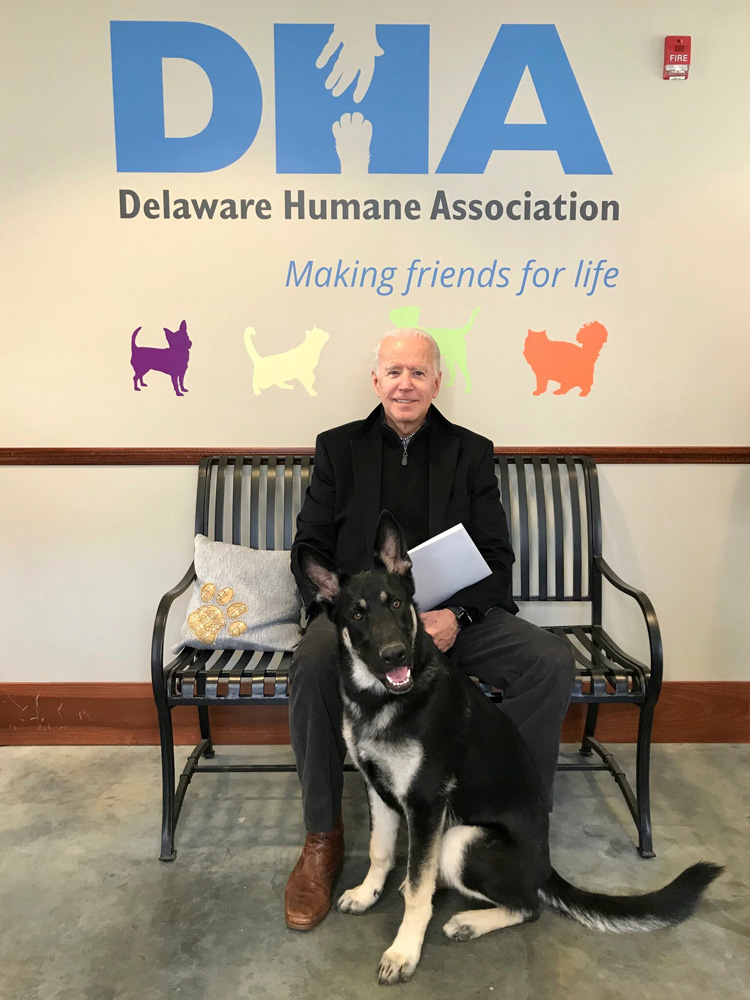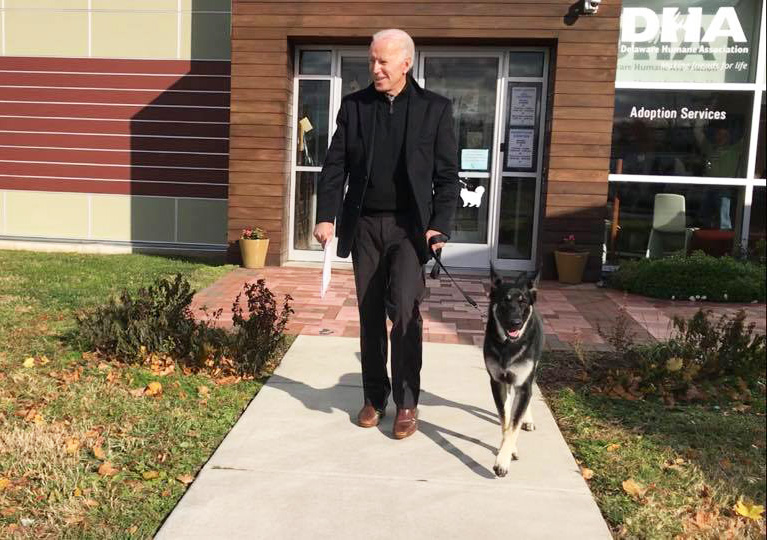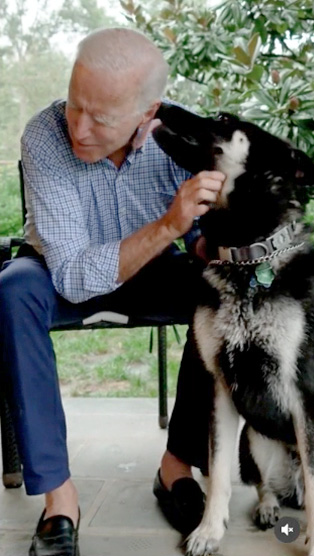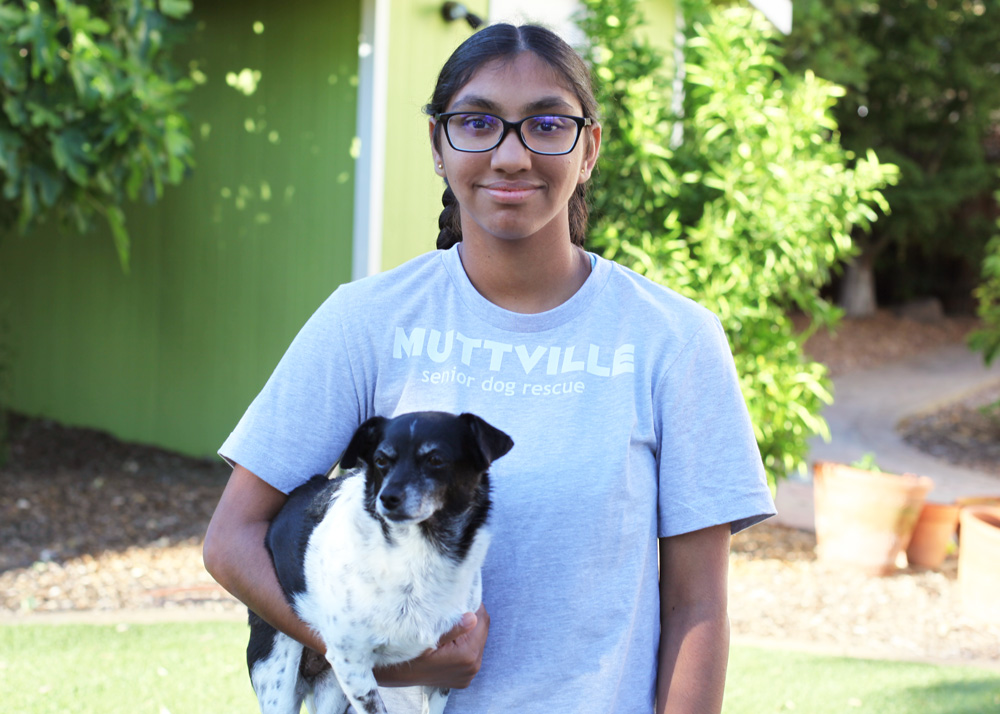- Dog CareDog LifeCommunity
- Photo Contest
Photo Contest- Giveaways
The Return of Dogs to the White House
After a four-year hiatus, dogs once again call the White House home. The First Dogs Champ and Major Biden, the German Shepherds of President Biden and first lady Dr. Jill Biden, have reportedly settled in nicely. "Major loved running around on the South Lawn," reported The first lady's office following the FDOTUS’s first days in the White House.
Major was adopted two years ago from the Delaware Humane Association when the pup was ten months old. The Bidens fostered Major for eight months before making it official. He is the first shelter dog to live in the White House.
Champ joined the Biden family in 2008. He’s no stranger to the grounds, having lived at One Observatory Circle, the Vice President residence, when Biden served as VP under the Obama Administration.
Shelters are also hopeful that having a rescue dog in the White House will bring a boost to adoptions.
Joe and Jill Biden photo courtesy of The Biden Campaign“This representation is not just normalizing adoptions, but celebrating it, because the public can see this is a really beautiful shepherd who is joining the White House,” Lindsay Hamrick, the director of shelter outreach and policy engagement at the Humane Society of the United States, recently told MarketWatch. “There are so many animals that are waiting for homes in shelters, so to be able to see one of them in the White House surrounded by tons of people, and having a really awesome life, sends a message that you can show up at your local shelter and find a healthy, happy dog to take home.”
Dogs and the presidency go hand in paw, appearing together at the White House since the 1700s with few exceptions. Former President Donald Trump was the first occupant of the White House not to have a dog in over 100 years—since William McKinley was president, in 1897.
In this deeply bipartisan moment, a return of dogs to the White House is one thing most people are able to celebrate.
“Dogs remind you to live in the present,” Biden told The Union Leader in a story on political pets earlier this year. “They love unconditionally and they savor every moment with you. When I’m with Champ and Major, I get to live in the ‘now’ for a moment with them, enjoy the simple act of throwing a ball around or taking a walk.”
There Are Going To Be Dogs in the White House Again—And One Is a Rescue!
This January we'll see dogs once again return to the White House—and one is a rescue! Major, Joe Biden’s German Shepherd, will be the first shelter dog to reside at the White House.
Photo Stephanie Gomez/Delaware Humane Association, via Associated PressThe Bidens adopted Major from the Delaware Humane Association in 2018 when the pup was ten months old. The Bidens fostered Major for eight months before making it official.
And the new DOTUS has a friend! The Biden family also includes another GSD named Champ who is no stranger to the grounds himself, having lived at One Observatory Circle, the Vice President residence, when Biden served as VP under the Obama Administration.
Dogs and the presidency go hand in hand, appearing together at the White House since the 1700s with few exceptions. President Trump was the first president not to have a White House pet in more than 100 years, says Andrew Hager, the historian-in-residence at the Presidential Pet Museum.
Though Major is the first shelter dog in the White House, he is not the first rescued dog. President Lyndon B. Johnson’s mixed-breed dog, Yuki, was found by his daughter at a Texas gas station.
Some of the presidential pooches became mini celebrities in their own rites, like Barack Obama’s Portuguese Water Dog Bo who is featured in several children’s storybooks and appeared on late night television.
Photo: Delaware Humane Association“Dogs remind you to live in the present,” Biden told The Union Leader in a story on political pets earlier this year. “They love unconditionally and they savor every moment with you. When I’m with Champ and Major, I get to live in the “now” for a moment with them, enjoy the simple act of throwing a ball around or taking a walk.”
Biden sometimes posts about his dogs on social media. “No ruff days on the campaign trail when I have some Major motivation,” Mr. Biden posted on Instagram in October with a pretty darn adorable accompanying video.
Pets are a tradition for presidents for good reason. Not only do presidential dogs provide companionship during stressful times, they also serve to make the president more relatable to the public, softening the image. Plus, who doesn’t love to work with an office dog?
If you’re considering a rescue pup to call your own, fostering is a great first step to find a dog that’s right for you, and who knows—you might just find your own Major!
» Ready to take the leap and adopt? Here’s how to help your new shelter pup settle in.
Orphaned Child Helps Abandoned Dogs
A 14-year-old animal advocate in California is dedicating her time to giving senior rescue dogs a forever home. She too experienced what it’s like to be abandoned.
At nine months old, Meena Kumar was left in a basket on a college campus in India, spending a year in an orphanage before she was adopted by a family in San Jose, CA.
She was two years old when she came to California, already possessing “a passion for animals,” the teen says. Her past left her with a strong empathy for animals left behind.
“I love dogs and I would like them to find a caring home and family just like I did,” says Meena. “The people who cared for me worked with the agency in the US to find me a lovely home and I want to provide the same support for dogs in need.”
Former Orphan Helps Adoptable Dogs
At the age of eight, Meena got her first dog from the Humane Society. “I wanted more pets and kept asking my parents to adopt more dogs,” she says. “My parents felt that adopting more dogs would be a lot of work and suggested that I think of other ways to help dogs.”
One evening she met her neighbour, Dr. Kathy Stecco, walking an older dog named George. Meena discovered that her neighbour takes care of senior dogs from Muttville, and learned about the rescue’s founder, Sherri Franklin, a 2016 CNN Hero. Meena has since become one of Muttville Senior Dog Rescue’s “most passionate” supporters, says the rescue organization.
“I did some research and saw that most senior dogs have a tough time finding a forever home,” Meena shares. “I felt that no dog should feel unloved and abandoned, and wanted to help them in some way.”
Volunteering wasn’t an option because Meena was a little too young, so she began brainstorming other ways to help, ultimately hitting upon an idea: “I decided that I would take care of dogs around my neighbourhood and donate all the money I earn to Muttville.”
Meena started Pet Fairy Services, a dog-sitting service, in 2014 and has since donated $14,000.
“When I first met Meena I knew she was something special,” says Muttville’s founder Sherri Franklin. “She has great passion for the plight of senior dogs, and her contributions have saved many lives! We are so grateful. It’s great to see a new generation picking up the cause.”
Now working towards a $25,000 goal by the end of 2020, the teen has partnered with Pebble Naturals, a human-grade pet supplement company, for a fundraising campaign. 100 percent of the profits from each bottle sold will be contributed to Meena’s fundraising campaign. (Use the code “MEENA” on pebblenaturals.com and 100 percent of the profit will be donated to Muttville.)
“Meena is a living example of how a business can be a powerful force for good. We’re so impressed by Meena’s big heart, and we’re excited to be a part of her fundraising campaign,” says Nayoung Susie Kim, one of the company’s co-founders.
Meena says family has been very supportive in her work. “Without their full support and help, I could not have done this. My entire family including my parents and grandparents have grown to love the companionship of dogs.”
Meena and her family adopted a Chihuahua Spaniel mix from Muttville that was found as a stray. “These old dogs often get euthanized just because they are older and they need more help than younger dogs at other shelters,” says Meena. “I want to help them find a forever loving home, the same way I found my forever home,” says Meena.
She encourages everyone to find ways to help animals and people in need “no matter what state they are in because it could sadly be you one day in their shoes,” she says. “Many of the senior dogs at Muttville remind me of my grandfather who passed away last year. I want to take the best care of senior dogs, the same way I took care of my grandfather. I want to help them feel at home.”
>> For more on Muttville Senior Dog Rescue, check out muttville.org.
Adopt This Puppy
We’re thrilled to feature an adorable, adoptable rescue pup on this issue’s cover! Our cover pup Piper is a 13-week-old Shepherd/Husky cross, rescued from Northern Canada and available for adoption through Cross Our Paws rescue. Piper is already tall for his age and should tip the scale at 65 to 70 pounds when he’s all grown up.
We also photographed two other Cross Our Paws rescue pups (yes, this is the best job ever). Piper’s littermate Anjo, a little girl with one blue eye and one brown, also joined the shoot, along with Olive, a four-month-old Lab mix. Olive is a Cross Our Paws “foster failure”—our photographer, Tanya King, started out fostering her but quickly decided to keep her. We can see why!
All three pups were rescued by Cross Our Paws Rescue, a BC-based, 100 percent volunteer run group founded in 2006. Many of their dogs, like Piper and Anjo are rescued from remote Northern communities. To date, Cross Our Paws has rescued over 600 animals with the help of about a dozen active volunteer foster homes that have opened their hearts and homes to help homeless dogs. Cross Our Paws does not have a shelter facility so their fosters are absolutely essential to their rescue efforts.
The group focuses on local rescue efforts, with most of their dogs coming from BC, Alberta, and the Northwest Territories. Bonnie Graham, the organization’s co-founder and adoption coordinator (both volunteer positions), notes the dogs that come into their care “vary from a German Shepherd to a French Bull Dog”—i.e. there’s dog to suit your fancy no matter your preference!
Want to help? Bonnie shares three ways you can get involved
Adoption
“There is a huge over-population problem globally. Adopting a homeless dog saves a life.”Fostering
“Fostering a dog can be one of the most rewarding volunteer jobs on the planet. It provides the dog with some stability and basic training and helps get them ready for their new journey in life. Many times foster homes fall in love with their foster dog and have first option to adopt permanently.”Escorting
If you travel a lot, you can escort a rescued dog by being his travel companion! If you fly frequently (Cross Our Paw’s rescues are mostly travelling from Northern BC, Alberta, or the Northwest Territories to Vancouver, though other rescues focus on other areas) you could escort a dog. This mostly consists of checking the dog in when you check in, picking him up upon arrival at your destination, and then passing him off to the rescue. Talk about an easy way to make a difference!If you’re interested in adopting our cover pup Piper, fostering, or escorting a rescue, contact crossourpawsrescue@gmail.com! Check out all of the dogs currently up for adoption through Cross Our Paws at crossourpawsrescue.com
Adopting Adult Pets
When considering getting a new pet, we often think of bringing home a puppy or kitten. However, adult pets are just as loveable and can sometimes even be a better fit.
Dr. Christine Rutter, clinical assistant professor at the Texas A&M College of Veterinary Medicine & Biomedical Sciences, explained the advantages of adopting an older animal.
“Adult pets are typically not as motivated to destroy property, such as shoes, blinds, and furniture,” Rutter said. “Adult pets are often already housebroken or take to housebreaking quickly, which saves the rugs and carpeting.”
In addition, adult pets are less likely to break the bank. Depending on the health status of the adult pet when it is adopted, it is possible that caring for adult pets is less expensive than puppies or kittens.
“Juvenile pets need a series of vaccinations, deworming treatments, and may even need to be spayed or neutered,” Rutter said. “Just like people, young animals are also more susceptible to infections and viruses, which can land them in the veterinarian’s office. The cost of these services add up.”
However, older pets also can come with their own challenges. Rutter said it’s common for adult pets in shelters to have a range of special needs, from simple fixes to complex treatments.
“It’s always important to have a veterinarian evaluate any new pet and perform a routine health screening,” Rutter said. “A veterinarian can also assess the approximate age of an adult pet and make recommendations for follow-up intervention and care, if needed.”
As you should with any pet, be sure to look for signs of illness at home. Any weight loss, excessive drinking or urination, decreased appetite, pain, or chronic diarrhea or vomiting should be reported to a veterinarian.
While each animal is different, caring for an adult pet may be an easier experience than raising a puppy or kitten. If you are considering adopting a pet, be sure to give an adult pet a chance.
Dogify Your Inbox
Sign up for the FREE Modern Dog Magazine newsletter & get the best of Modern Dog delivered to your inbox.
"*" indicates required fields
By clicking the arrow, you agree to our web Terms of Use and Privacy & Cookie Policy. Easy unsubscribe links are provided in every email.
